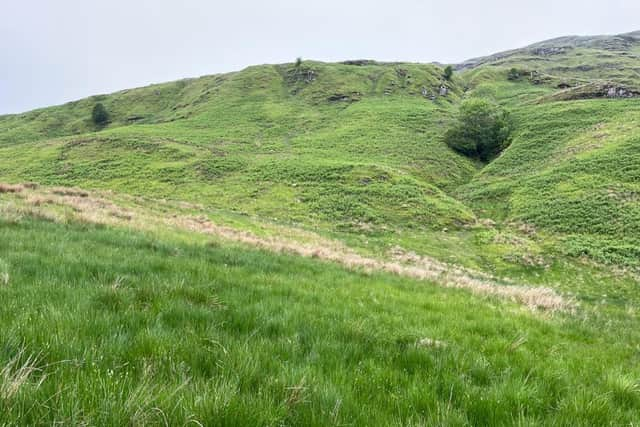Asulox: Scottish farmers denied use of herbicide to control spread of bracken
Farmers have been banned from using a herbicide to control the spread of bracken growth in Scotland.
Asulam – which is sold under the brand name Asulox – has been granted approval over the past decade to be sprayed from helicopters to treat the invasive weed in areas that are difficult, and in some cases dangerous, to access by vehicle.
Advertisement
Hide AdAdvertisement
Hide AdThe Scottish Government has now said the risks to the environment and human health do not outweigh the benefits.


Use of the chemical, which was banned in 2011 by the European Union over fears it could be an endocrine disrupter, relies on an emergency approval being granted each year by ministers.
Farmers have been calling for permission to use the herbicide, insisting the spread of bracken harbours ticks, which then leads to the spread of tick-borne diseases such as Lyme disease and Louping ill. They also said areas where the weed grows causes a wasteland and creates fuel load for wildfires.
With some farmland being on steep hillsides, farmers said aerial spreading was the only method available at the moment to target unwanted growth.
On Wednesday the Scottish Government said that, for the first time, the Health and Safety Executive (HSE) had recommended refusing the pesticide’s use in 2023 to all four UK nations.
The Government said the HSE considers use of the herbicide "does not meet the legislative requirements for emergency authorisation". In England, however, emergency authorisation was granted by the Department for Environment, Food & Rural Affairs (Defra) earlier this week.
Rural affairs secretary Mairi Gougeon said the Scottish Government was aware of the risks associated with uncontrolled bracken and had based the position on scientific evidence.
She said: "The Health and Safety Executive advice to all four nations of the UK was not to authorise the use of Asulox because of the risks it poses human, animal and environmental health.
Advertisement
Hide AdAdvertisement
Hide Ad"Independent advice from the chief scientific adviser and the Expert Committee on Pesticides supported this conclusion, and the Welsh government have confirmed that they too will follow the HSE advice."
The decision has prompted a backlash from rural groups in Scotland, who will now be required to tackle the spread of bracken using physical methods – cutting, bruising, trampling and pulling.
Scottish Land and Estates, a membership organisation for landowners, said the announcement has been “another kick in the teeth from the SNP-Green Scottish Government”.
The group has called on ministers to reconsider their position, adding: “There has been no meaningful engagement with farmers and land managers on this in the past year.
“Other bracken control methods, like cutting, require extremely expensive cutting machinery. Cutting is impossible on steep slopes and upland areas, and therefore targeted use of Asulox has been used to control bracken in those settings.”
Scottish Conservative MSP Finlay Carson said: “Mairi Gougeon will quite rightly be strongly challenged in her decision. There is no new evidence to suggest that the regulated use of Asulox is not still the most appropriate way to control bracken in certain situation.”
Campaigners who are against the use of dangerous chemicals say there is a risk the chemical can cause cancer. They are concerned the the spraying of bracken could lead to the chemical entering water sources. There is, however, no direct evidence on a link between Asulox and cancer.
Farmers have said before any spraying takes place, they have been required to carry out strict environment surveys of the land with NatureScot to ensure there will be minimal disruption to wildlife and to assess contamination risk.
Advertisement
Hide AdAdvertisement
Hide AdSimon Thorp, a representative of the Bracken Control Group, which has been pressing the Government to approve emergency authorisation over the past year, previously told The Scotsman: “The issue is not about Asulox – it’s about bracken and the impact bracken is having on biodiversity and humans.
"There are ongoing studies into the material that comes out of bracken and it’s link to cancer and the impact it has on water quality. As a plant, it also smothers everything, and tick numbers are increasing dramatically because there is a strong link between them and the plant.
“We need to find a balance of the risk. Yes, it’s a herbicide, but the downsides are reasonably benign when you look at the impact of bracken.”
Comments
Want to join the conversation? Please or to comment on this article.
